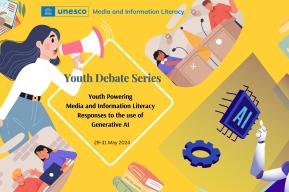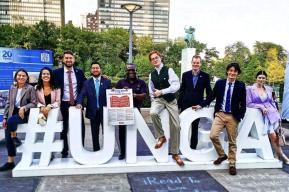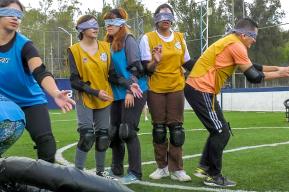Young people are central for tackling the COVID-19 crisis and finding new ways to transform their lives and communities. To respond to the challenges of the new post-crisis reality and help shape a better future, they are once again leading the way with their innovative and disruptive ideas.
Akwasi Sarpong (35) from Ghana, a youth leader and representative of the youth-led Ulti-Leaf Foundation, which operates under the UNESCO Youth Civic Engagement Initiative, has developed two civic-care initiatives to engage young people in prevention activities to fight COVID-19. One of them is the “Stay Safe” flyer, which promotes proper hand-washing gestures to slow down the spread of the virus and stop disinformation and stigma around the victims of COVID-19.
“Prior to the first two confirmed COVID-19 cases in Ghana on 12 March 2020 and subsequent lockdown, I led the Civic-Care project team, whose aim was to share relevant information adopted by the World Health Organization (WHO) on immediate precautionary measures to stop the spread of coronavirus. We developed a flyer on how to wash hands properly in eleven steps, in accordance with the WHO hand-washing guidelines. This enhanced the diffusion of knowledge and skills on public health education and behavioural change communication related to COVID-19 among youth in Ghana. We also shared #COVID19 messages in a way that captivated and compelled young people to stay safe. To this end, the Civic-Care Hand-washing flyer ’Stay Safe” was developed and before major cities went into three-week lockdown, one thousand copies were distributed to various communities. Also to distribute the flyer through digital means, special civic-chats on WhatsApp were set up. It also provided an opportunity to initiate online discussions and opinion exchanges to stop fear and disinformation about the survivors and victims of the virus. Furthermore, some hand-washing demonstrations were undertaken by the project team. Last but not least, the Civic-Care project partnered with international and national organizations to publish content related to the pandemic on social media and in Youth vintage points and marketplaces.”
Another initiative implemented by Akwasi is the social media campaign #WearUrMasks. This campaign consists of a photo challenge which serves the dual purpose of encouraging young people to wear a mask in public places in Ghana and disseminating useful information regarding masks as an important tool in the fight against COVID-19.
“In response to the national directive on mandatory wearing of masks, I have developed another initiative which is a fun and engaging online photo challenge for young people in Ghana. The photo challenge seeks to encourage young people to contribute to preventing the spread of the virus by sharing pictures of themselves wearing a mask on the Foundation’s social media platforms. This campaign also serves as a public health promotion and as a behaviour change awareness campaign to stop the spread of COVID-19. On my social media and on the Ulti-Leaf platform, I have been sharing basic tips on types of masks, in particular the re-usable masks, used by most of young people, due to its cost-effectiveness in Ghana. Finally, through the hashtag #WearUrMask, the campaign provides young people access to the Ministry of Health guidelines on the wearing, production and use of re-usable masks.”
Ghana is one of the countries that immediately put reinforced preventive measures into practice, since the COVID-19 started its spreading in the country in early March. The restrictions of movement and social distancing measures were scheduled across the country in order to help slow down the spread of the virus. In keeping with a national response and coordinated response, Akwasi’s initiatives are leading the way towards behavioral change among the youth in Ghana and beyond.
***
- Learn more on the My COVID-19 Story campaign here!
- Share us your inspirational story by creating your own video! How? Sign up and do it here
- UNESCO Youth Programme










